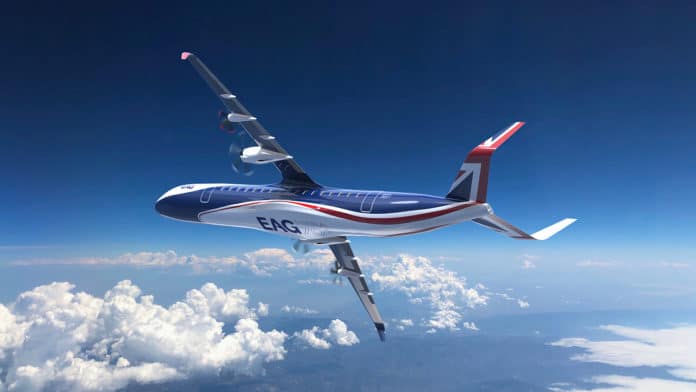Developers are currently considering hybrid and electric aircraft as one option for reducing the impact of aviation on the environment. At the same time, due to the relatively low specific capacity of batteries, most projects provide for the creation of regional passenger aircraft, designed to carry a couple of dozen people.
Electric Aviation Group (EAG), the UK-based engineering and development firm, unveiled on Monday the design of a future regional aircraft with hybrid-electric propulsion. The company expects its first aircraft to be in service 2028 in order to reduce CO2 emissions.
The new design is for Hybrid Electric Regional Aircraft (HERA) that will be able to carry over 70 people and will initially offer 800 nautical miles (nearly 1,500 km) range.
The HERA would deliver significant fuel savings, a reduced noise footprint (that meets requirements for 24/7 operations), and new flexibility for air transport (cabin flex).
The British aircraft will be assembled according to the high-wing layout with an extended wing and twin fins located at the ends of the horizontal tail. It would be capable of landing-gear-assisted take-off, for quick acceleration, and short-field performance. The aircraft cabin is planned to be modular, which enables passenger operation during the day and cargo operation at night.
Other details about the project of the aircraft have not yet been disclosed.
The EAG teams thus claim to be “the first” to occupy a market which they estimate at “$4.4 trillion”. The group claims to have already filed 25 patents and expects the creation of 25,000 jobs and unlock $5 billion investments in the British aviation industry.
“We expect this to be a great example of British design, engineering, and build,” said Kamran Iqbal, founder and CEO at EAG. “Not only will the development of the HERA help the Department of Transport accelerate its ‘Jet Zero’ carbon reduction goals, but it will also help to create much-needed job opportunities in the aerospace, manufacturing, engineering and services industries post-Brexit. This represents the future of both passenger and cargo flights internationally, and as an opportunity for investment, it could not be better timed.“
